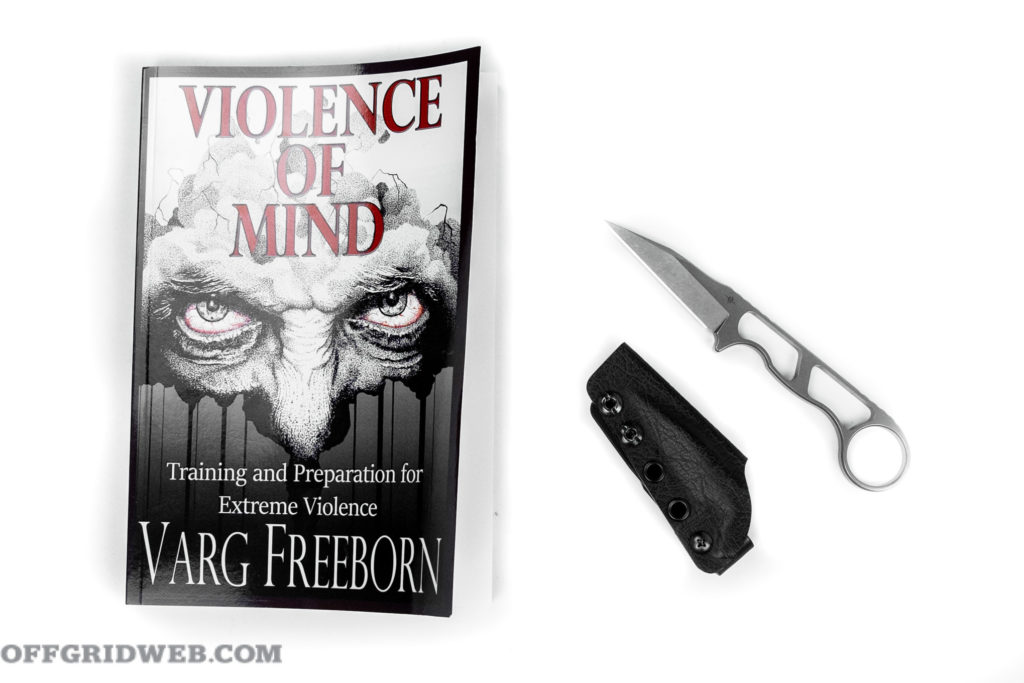RECOIL OFFGRID Survival Book Review: Violence of Mind by Varg Freeborn
One part criticism, one part methodology, Violence of Mind pokes at the soft tissue of how we think of self-defense in order to build a foundation that combines the irreverence of a street fight, with the analytical benefit of systematizing one’s mindset. In this, the book offers two benefits: first and foremost as a cheque to one’s own ego, and second, as an attempt to build not only a roadmap of training progression, but heuristics to protect one’s self from the self-sabotage of misguided intentions. Varg Freeborn announces from the beginning that this work is written to construct the mental foundation needed to support and inform one’s survival, by evaluating one’s actual versus perceived goals, and holding rigorously to them.
In essence, then, this book functions as philosophical, in its true form. In a world of “gotcha” criticisms heavily driven by ego, Violence of Mind begins with asking what is the goal of self-defense, and allows no wiggle room for weak answers. Jabbing at trendy phrases like “I’d rather be judged by twelve, than carried by six” and injecting the physical, mental, legal, and moral aspects of something like self-defense, he balances the criticism with constructive experience and direction.
Varg Freeborn then brings a violent breath of fresh air on how we think about situational awareness, and offers some perspective from the mind of a predator. A recognizable shift from the oft-quoted and long-sterile examples bad SA, he ushers in a different paradigm of broadening one’s range of perception: a sharp contrast to the hyper-vigilance model. In a world of pseudo-intellectuals who attempt to look smart by noticing a single feature, or simply reverting to the criticize-people-for-being-in-their-phones approach, he addresses how we oscillate between attention to detail and wide-band observation intentionally and how to train it in.


Above: Varg Freeborn is strongly opinionated about the use of knives, from what type of knife is carried, to appearances, to legalities, to what the court might think. The Toor Knives Jank Shank may fit well, but it's you're choice.
Some of the most valuable aspects of Violence of Mind are diving into Marc MacYoung's hierarchy of escalation, and the author’s structured ideal training pathway. By identifying the distinction between “advanced” and “specialized” training, he draws a line that separates CQB from advanced self-defense. In this, he argues that certain forms of training, while having been marketed as advanced, are really only specializations, and need to be recognized as such, especially by the student.
This book belongs on the shelf of both those who are pursuing their own capacity for self-reliance through self-defense, and is a must-read for any who wishes to instruct. As the book cuts apart the poor arguments we have used to justify bad habits or mental laziness in the past, a path to redemption is paved in within the pages that balance the critique of current and past trends, with the methodological approach to how we think of training itself. Instead of asking what to train or why we train, this work addresses how we think about training and self-defense, and in doing so, represents academic rigor without the ivory tower.
The title is correct in describing the objective of the book. While the term Mindset is certainly trending at the time of writing, the opening chapters of the book are instrumental in self-reflection. That being the case, as the chapters carry on, some arguments fall into the pattern that has been seen before with the elite special operator types, sounding something like “you don't know because you're not a hardened criminal like me.” It can be offputting, but we're talking about violence here.
This, however, works to the advantage of the reader, for just as the Varg identifies, ego can quickly become self-destructive when violence occurs. His argument from authority challenges the reader's ego, and highlights the value of the book as a tool of self-evaluation. For those who take seriously the reality of violence, their disagreements with the author will also be taken into consideration knowing they have skin in the game, rather than responding emotionally. Violence of Mind is ultimately a tool of introspection with deadly consequences.
Author: Varg Freeborn
Pages: 223 pages
MSRP: $17 on Amazon (Buy Here)
URL: violenceofmind.com
 STAY SAFE: Download a Free copy of the OFFGRID Outbreak Issue
STAY SAFE: Download a Free copy of the OFFGRID Outbreak Issue
No Comments